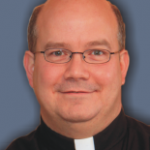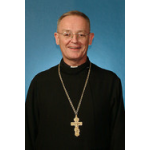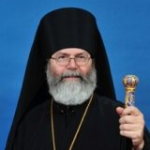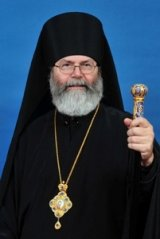
Deprecated: trim(): Passing null to parameter #1 ($string) of type string is deprecated in /home/aoiusa/public_html/wp-content/plugins/sexybookmarks/public.php on line 388
Deprecated: trim(): Passing null to parameter #1 ($string) of type string is deprecated in /home/aoiusa/public_html/wp-content/plugins/sexybookmarks/public.php on line 394
Deprecated: trim(): Passing null to parameter #1 ($string) of type string is deprecated in /home/aoiusa/public_html/wp-content/plugins/sexybookmarks/public.php on line 400
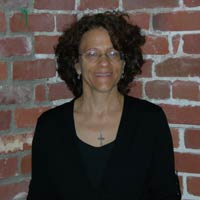
Dr. Lynne (Magdalene) Pappas
Source: pravoslavie.ru
Dr. Lynne Pappas, in Orthodox baptism, Magdalene, is a highly respected psychiatrist, board certified in child, adolescent, and adult psychiatry, practicing in Butte county and the Chico area of northern California. She has been practicing psychiatric medicine for over twenty-two years. She is also the president of the parish council of the Church of St. Andrew the Fool-for-Christ in Redding, California, a parish of the Serbian Orthodox Church. Dr. Pappas has agreed to share her professional knowledge with us on one “evil of the day.” Dr. Pappas is interviewed by Nun Cornelia (Rees).
Nun Cornelia (Rees): The subject of our conversation today is something that has been troubling many Christians in recent yearsthe general rise in the acceptance of homosexuality as a norm in many historically Christian countries. Legislature in the U.S. and other countries has dictated that homosexuality is not a psychiatric illness; and although most studies have shown that homosexuality is not genetically inherited, homosexuals are increasingly being treated as a minority group, which requires the protection of human rights legislation and tolerance education. One concern is not only how this affects the Church or society in general, but also how it affects those individuals who are experiencing homosexual inclinations but do not want to consign themselves to a homosexual lifestyle, and are seeking help. As a practicing psychiatrist, you have undoubtedly seen this conflict. What do these people do if they are told that they need to be accepted, rather than healed? What can you tell us about this?
Dr. Lynne Pappas: First, I will speak to what you said in terms of the change in what we will call a paradigm. All of us look to markers in our environment and our worldand we are spiritually affected by them as wellof what is truth, what guides us in how to function in life, what is reality. So, we now have a situation where the world tells us that what was once held as abnormal, not of God, not a healthy lifestyle or choice of relationship, is now normal. We now have a shift in paradigm, the rules are all changed, and people are being told that the prior view was false and that we have a new reality. That reality then says, “Anything that I feel is good for me,” whether it be men with men, men with boys, women with young girls, or people with animals (people don’t stop with one thing). Now they are saying that all of these things are just alternatives, and this diversity is “normal”. Every individual has an inherent seed within him of the truth of God, and knows somewhere in his heart and soul that these things are wrongbecause we do feel that. Yet they are being met with an external environmental world that says, “That which is guiding you inside is not right.” It is a pressure that unsettles everything. Thus, people no longer have any boundaries, any anchor, or marker of what truth is. This is very important to remember in looking at this whole issue, because it has taken everything and turned it upside down, so that people do not know where to go.
Nun Cornelia (Rees): Living in California, an especially near San Franciscothe gay “Mecca”, do you notice a trend that goes beyond acceptance to outright encouragement of homosexuality?
Dr. Lynne Pappas: Very much so. Furthermore, it is encouraged with an undercurrent of anger, which you can sense when you come into contact with this life and this worldthere is actually a very powerful undercurrent, which is in fact the power of evil. There are many different reasons for this anger (and this anger is filled with pride), this power, this dominance, this exertion of an individual right to take care of oneself, and have something be whatever “I want it to be.” It is a very powerful thing. So people, especially in California, are coming out and voting to have gay marriages legalized. This has already happened in some other states. But it is not that people are just standing back meekly, saying, “I want to be with my partner.” It is actually a campaign, a fervency to force themselves and you to accept their ideology.
Nun Cornelia (Rees): How has this progressed from the gay individual’s desire to not be discriminated against, or perhaps just not beaten up, to a planned, financed, aggressive program aimed at all aspects of societythe judiciary, the media, and even the educational system, all the way down to elementary school? From the psychiatric point of view, what is going on in their minds and their hearts that pressures them to try to forge a new society, if you will, in their image? Is it a simply a matter of pride? Of raising their own self-esteem by reforming the attitude of everyone around them?
Dr. Lynne Pappas: I don’t know if I can answer that question for you fully. The people who come to me are not often so militant in their desire to change society. Some want that as wellalmost, again, as a validation of their choices, a validation of how they have covered up their own wounds. Because, at the heart of this whole struggle is people’s desire to be loved, to find a place where they feel that they are cared for, that they belong, are nurtured, accepted. There is a whole host of things that lead people to this place in their lives. So, the militant aspect of it is an extension of that undercurrent. When somebody is hurt or angry, he can have an initial reaction of being defensive, being meek, or beaten down; but then you often find at the other end of the spectrum that those emotions then continue to grow into rage. So, this militant rage is on this continuum of a rage that is present, but not all people exert it to that degree. When we are not living with God, truthfully and at peace, then there is rage, anger. Often that rage is very hidden, tucked away; our defenses are so good that it does not come out for other people to see. At other times that rage is unleashed, and it is not so well hiddenand that is when you find the militant aspect, when people are wanting to push their agendas to “get back”, as I think, at God, not just at people. It is a way of lashing out at all the things inside that are so messed up. It is just an externalization, a representation, a symbol, which has nothing to do with what is really going on in their heartsbut they think it is.
Nun Cornelia (Rees): Your explanation makes sense, but this brings us back to the fact that until rather recently homosexuality was legally regarded as a problem requiring psychiatric treatment. Further back in time it was not viewed as a psychological problem, but it was considered a grave sin, even a crime, and still is in some parts of the world. People were punished for it, so that it would not spread out to the rest of society. All Christians considered it a sin and Orthodox Christians still do. In the U.S., the laws have changed, so that it is no longer viewed as a psychiatric illness, and people no longer “need psychiatric treatment” for homosexuality. Nevertheless, I think that some people do seek treatment for the problems underlying their homosexuality. In your experience, are people seeking psychiatric help for their underlying problems, or specifically for their homosexuality? Are healthy people who engage in homosexual behavior developing psychiatric problems?
Dr. Lynne Pappas: No one who engages in homosexual activity is psychologically healthy. It is, again, an action and a manifestation of a distorted perceptions of pain, feelings of rejection, abandonment, loss, and a desire to be free of our separation from God. It is one other manifestation of how we seek fulfillment in an aberrant way. It is never something that is being led by health of the soul, or heart, or person.
Nun Cornelia (Rees): In the media, we now see a trend of trying to show that homosexuals are mostly psychologically adequate people who have simply taken up this orientation (although as I have read, analytical statistics show otherwise). Therefore, they are perceived as adequate to, say, adopt a child, or lead Boy Scout troops. Of course, the assumption in the child adoption system is that only a mentally stable person should be allowed to adopt a child. If psychiatric practice is showing that homosexuals are not stable, how could they be allowed such control over vulnerable children?
Dr. Lynne Pappas: What you are saying presupposes that psychiatry and the systems have a real notion of what normalcy is. Outside of God, and we live in a godless society, no one really has a sense of what is normal, and so they make it up, they make it fit what they want it to be. That is why we have what we have. They have made a new definition of what normalcy is, and tomorrow they will make another one, based upon whatever urge they have at that point in time. And God is nowhere in the picture. It all comes back to that, and so we have redefined what a family is. We no longer look at what God created and said is a family, what God created and said is the “order of things”. We have thrown Him away, because we don’t need that, we don’t even know that He exists, and we are determining our values according to what “feels” good. Then, the passions drive thingsmomentary passions. So, the momentary passions and lusts are now what defines normalcy.
Nun Cornelia (Rees): You have run up against this redefined normalcy first hand in the legal system. Can you tell us about this?
Dr. Lynne Pappas: Well, I had a patient who, let’s say, struggled with his life of homosexual activity. He was very tormented, and came to see me, to engage in therapy. He was extremely depressed, and struggled with suicidal thoughts and attempts. He was encumbered by drug addiction, cocaine addiction, and he had engaged in perverse practices. You see, the homosexual lifestyle can be extremely perverse; it is perverse by definition. But the perversity can go on a continuum as does all evil; it can continue to get more and more severe. And so he had engaged in significant activities that, again, are quite demonic, in the sense of the torture, tormentthe things that people do to one another. He was haunted by all of this. He had been molested as a young male by a male teacher and had never dealt with that trauma, and had accepted from his early years that this situation had occurred because of what he is. He accepted a belief that he would never have had that molestation, that it would never have occurred, if this was not his life. He accepted this external circumstance as an indicator that he was homosexual; because otherwise, he thought, why would a man engage in such practices with him? Well, from that point on, his development as a young boy was very distorted, very traumatized, and every time he would look around him he would find things that he would put into this growing paradigm about himself, things that he would pull in to support the fact that he was gaythings from the media, from other people, the ideology or the feeling that this was something that he was genetically born with. So, he began to incorporate that. How do we begin to incorporate delusion and lie? It just continues to feed, and it feeds. So, before long, by the time he had hit his late teens and early twenties, he had constructed an entire world as if he were a playwright, the world and everyone else were adding in pieces of his character formation, and now his character was being formed by all of this input. This is what happens with society, with the media, with the worldit forms us, and we accept pieces of it, if we have nothing else that forms us, if we do not have God, and there is no one to help us. If we have no sense of what is true and what is not.
So, when he came to me he was very traumatized, but his initial desire to look at his sexuality was not what he came for. He came to look at his depression. Well, with time, how can one look at one’s depression without looking at what led up to his being depressed? He was looking at his life, his upbringing as a child, his relationships with his mother and father, the aspects of nurturance, non-nurturance, and his question of whether he ever fit in, was ever accepted or loved. It became clear over time that he was accepted and loved by this man. Here was someone who showed him incredible attentionphysical attention, comments about him, etc. That then became his accepted way of life. All of this began to uncover for him, and he began to question his previous assumption that he was born gay. He then started looking at issues of his life, and chinks started happening in that armor, that paradigm. All of a sudden, pieces of light started coming through, and he was somewhat unsettled by that.
Well, I have never hidden my Orthodoxy during my practice; I never hid who I am and where I come from. You know, I had a professor at the child psychiatry department where I trained who once said to me, seeing that I wear a cross, “You need to take that off.” I said, “Why is that?” He said, “Because you are supposed to be a blank slate for people as a psychiatrist, and you are influencing somebody by wearing that cross. Your cross influences their thinking, whereas they are supposed to come up with things on their own. You are being a paradigm.” I looked at him and said, “Well, frankly I think that I am at least honest. At least my belief is on the outside, so that people know who I am in my paradigm. I could go to someone else, a Buddhist or a Hindu, and his or her paradigm is still going to come through in everything he or she says to me, but I won’t know it. To me, that is deceptive. “
Thus, the patient could see that I wore a cross, and he began asking questions about God. Over the next couple of years he began moving to a place of not believing that he was born gay; he started working through his history, even became involved with a woman, and was in love with her. She became pregnant but terminated the pregnancy, and he was devastated. In his devastation, he had a relapse of his drug addiction and everything fell apart, and he blamed Godand me. So, ultimately, he sued me for what had become an unethical thing with the psychiatric association, because in essence, homosexuality is no longer considered pathological, and therefore my Christianity was cited as being an improper “imbalance of power”. By having a cross around my neck, an icon on my wall, and a Bible on my desk, I was accused of unduly influencing this man, whovoluntarilycame to me. That he came voluntarily and stayed for three years was irrelevant to them. It was the mere fact that God was present, and that I had “forced” him to listen to this.
Nun Cornelia (Rees): This is a case in point. Obviously, he sued you because he was not balanced, but the state did not take that into consideration?
Dr. Lynne Pappas: Because the state says that he is. Because the laws and what has been determined as normalcy by the world say he is “okay”.
Nun Cornelia (Rees): Was he successful in this lawsuit?
Dr. Lynne Pappas: I settled the lawsuit. We went as far as a deposition, and I settled the lawsuit without going to trial.
Nun Cornelia (Rees): So, to a certain extent, it could be said that he “won” because he received a settlement. Now, could this have a cooling effect upon other psychiatrists who are of the mind that their patient’s homosexuality is part of the whole problem that is making them depressed?
Dr. Lynne Pappas: I will say to you that homosexuality is a causative factor in depression. There is not a “maybe.” It is not the only thing, but unequivocally, it is an issue. Now, will you find other psychiatrists that are willing to say that? Maybe a few. But again, you are going to find that, even among Christiansand I am speaking of the denominational, versus the Orthodox world you’ll see it is as with heresy in Christianity: before long, anything is acceptable. So, you will find many people who consider it just fine, and they will not make a statement, as I have.
Nun Cornelia (Rees): Where does that leave people who really need healinghealing of their homosexuality? Does that mean that they are more and more just out of luck, with no one to go to? Will they find that there are fewer and fewer psychiatrists willing to talk about it?
Dr. Lynne Pappas: Not necessarily. If a person comes to a psychiatrist or psychologist ready to make that statement, they will find someone to help them. I think that the question you are posing is: what about all the people who don’t realize that it is a major part of their struggle, their pain, their continued disease? It is interesting that when we talk of disease, we think automatically of a pathogen or bug growing in us, or an infection caused by bacteria or virus, as opposed to something that is caused by an infection of the soul. That is what this is. As with so many things in our society today, it is getting harder and harder for people to see what the infection is, because we have “normalized” so much, in terms of the parts of our soul that are becoming devoured by sin that we have now declared “normal.”
Nun Cornelia (Rees): Like declaring, on the physical level, that cancer is normal?
Dr. Lynne Pappas: Absolutely. It is eating you away inside, and you keep covering things up, and acting as if that is how it should be. This is how it is with a life of homosexuality. You think, on the surface, that you are okay, you are happy, but in reality, inside, you are not. You keep playing at it, and playing at it. I know people that have been in homosexual relationships for fifty years, and they would say to me, “See, this is perfectly fine.” I would say back, “It is wonderful that you have a caring for one another, but you are still not able to see that which is separating you from God.” And that is the crux of it. They are willing to settle for that momentary feeling of comfort by holding on to someone in the world, because they don’t know that what they are really looking for is God.
I suppose I keep coming back to that, because you can’t examine this problem outside of God. And in the world today, where you don’t examine it with God, it is going to be what it is. So if people who are struggling don’t know that they are missing God, then they are not going to arrive at seeing that this is what it is all about.
Nun Cornelia (Rees): One holy father said that every human being possesses an unquenchable thirst for God, but it is a satisfying thirst, even in its unquenchability. If people are not seeking God, that thirst is not being filled, and so they try to satisfy it through insatiable passions.
Dr. Lynne Pappas: That is what happened with this young man. I have tried to help other people with whom I have worked to come to an understanding that this thirst that they have is really a thirst for God. They didn’t know it because they grew up without God in their lives. They were not raised in a Church, or with any understanding of God, and so all they understood is that they had an unquenchable desire and thirst for something, and the only markers that the world has around us are the passions. There is no other explanation for this longing offered; thus, only when you begin to say that that is what it is, that God is what they really want does a window open, and they can start seeing that God is what they crave. That is why people in these fifty-year relationships will, on the surface, defend to the hilt their belief that everything is just fine. But if you look in their hearts, you will see their emptiness, and how it all falls short. It is the falling short of what they are looking for that is so evident to me in my work with these people. Because it is not of God.
Nun Cornelia (Rees): So, the rest of the world, through the media, is also being convinced that these people are all just fine.
Dr. Lynne Pappas: Again, they are convincing themselves. We lie to ourselves, over and over again, and we don’t know how to listen to that voice in our heart. That voice in our heart talks, but people are used to drowning it out.
Nun Cornelia (Rees): This tragedy on an individual level is unfortunately developing into a problem that affects whole Churches, denominationsthe idea that you can have a pastor, even a bishop, ministering to families, who is openly gay. Of course, the issue is still clear in the Orthodox Church. But what would you say to people who are Orthodox, but suffer from this weakness? Should the Church be tough on these people? Should they be summarily brought out into the open? Or should they be dealt with quietly, individually? How can we avoid the catastrophe that the Catholic Church is now experiencing?
Dr. Lynne Pappas: I do not want to even pretend to think that I know how things should be done, but I would hope that it be dealt with on an individual basis. My prayer for all people is that in the Churchthe True Chruchwe would have people bold enough to come alongside brothers and sisters who are struggling in sin, in some way, with a desire to help them see their failing. Again, as with anything to which we are blind, we are defensive, we are prideful, we are very fallen, and we don’t want to see that which is painful for us to see. But how else can you deal with this but by individually coming alongside someone in love, and having ways to minister to people, to help them gain sight? That is what this is about. We have the fathers, we have the Word, we have so many things that are there, what God gave us as our truth, and we have love. That is what we have to give people in order to open a door for them to begin to see what wounded them, and what their hearts have done to try to take care of themselves. Because that is what this is: a method of trying to take care of our own heart when we have been so hurtwhen we felt abandoned, rejected, when we felt that God is not there for us, that we have to do something on our own to make it okay.
Nun Cornelia (Rees): Backtracking a bit, could a large portion of homosexuals reveal an incident in their past similar to the one experienced by the patient you described? Could this be called an epidemic, spread by people who need to be stopped? In other words, were former societies justified in putting these people in prison?
Dr. Lynne Pappas: No. (Unless, of course, they do commit a sexual crime such as rape or child molestation.) It is a reflection of how we as human beings deal with things that frighten us, with things that we don’t understand, and that make us uncomfortable and threaten us. We are filled with rage, we become dominant, powerful, and hurtful, and try to destroy them. In essence, our hearts are just as sinful, but it is coming out in a different venue.
People come to a life of homosexuality, or experiences of homosexuality, from different causes. There are people who have had molestations, and then began to be afraid of the opposite sex, but still want nurturance. You have other people who as children were not nurtured, who were not fed, cared for, loved, or stroked, and they seek nurturance. It gets misplaced. They start looking for a mother, as are many women living a lesbian life, or a father, in the case of male homosexuals, and it all becomes so distorted. They don’t see it on the surface, but what is driving them is a desire to connect, and not necessarily in a sexual or erotic waybut that is the only way our fallen world knows how to do it. Everything is sexualized. So people automatically jump from a heart that needs to be nurtured and stroked to something erotic, because that is where the world has told them to go. Yet, everyone who has struggled with this desire to be loved in a homosexual way is searching for the purity that I am talking about. It does not have to be the outcome of trauma or abusethey can just start exhibiting this activity as children. Does that mean they should be locked away? No. Should they be criminalized? No. They should be offered an understanding of love, and know what is in side of us, what they are searching for.
Nun Cornelia (Rees): Have you known people who were able to work their way through this struggle by the Sacrament of confession?
Dr. Lynne Pappas: Yes.
You work around, you work underneath, you work on what is occurring with them, because the defenses are so great on the surface.
Nun Cornelia (Rees): So, this is not a job for just anyone who comes along.
Dr. Lynne Pappas: No. But I think that there are people who are able to do this kind of work, and understand how to approach these things, unlike the medieval world where you just put them all in prison. There are people who are designed, trained, or brought up by God to find a way into someone’s heart, around their defenses.
Nun Cornelia (Rees): Of course, we know that this has always existed, and we find mention of it even in patristic literature. We also all have our free will.
Dr. Lynne Pappas: If I want my child to go do something he does not want to do, I will not necessarily say, “I want you to go do this,” but will phrase it and work with him in a way that will not excite his defenses, which are geared to opposition. Rather than saying, “go make your bed,” I will try to say something to engage another part of his heart, so that he will want to do it himself. Then he will go make his bed, and we don’t have a war. This is knowing the heart of my child, and it is knowing the heart of our brothers and sisters. It is coming to someone in love, realizing that a matter of the heart is at stake. We ask, how does God direct us to deal with that person?
Nun Cornelia (Rees): And of course, we pray for them.
Dr. Lynne Pappas: Absolutely. That is where we must always begin.
